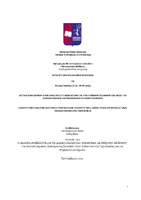Θετικά συναισθήματα και πρακτικές ευγνωμοσύνης για την ευημερία των μαθητών μέσω της διαπολιτισμικής κατανόησης και ευαισθητοποίησης
Positive emotions and gratitude practices for students’ well-being through intercultural understanding and awareness

View/
Keywords
Θετικά συναισθήματα ; Πρακτικές ευγνωμοσύνης ; Ευημερία μαθητών ; Διαπολιτισμική κατανόηση ; Διαπολιτισμική ευαισθητοποίηση ; Δευτεροβάθμια εκπαίδευσηAbstract
This study focuses on investigating the impact of positive emotions and gratitude practices on students' well-being through intercultural understanding and awareness. In the educational context, students' well-being, which includes their psychologicaland emotional state, is directly related to their academic performance, social relationships, and overall development. At the same time, intercultural understanding and awareness promote an environment of acceptance and support (Fredrickson, 2018; Emmons, 2017). The study develops and implements an e-Course based on the theory of positive emotions and gratitude practices with the aim of enhancing students' well-being through intercultural understanding. Secondary education students actively participate in the e-Course through experiential activities that encourage the cultivation of positive emotions and gratitude. The effectiveness of the program is evaluated using questionnaires and rubrics, recording students' progress before and after completing the e-Course. The study's problem focuses on the need for an approach that combines the cultivation of positive emotions with intercultural understanding. Positive emotions such as joy, gratitude, and hope enhance resilience and reduce anxiety, while gratitude practices improve relationships among students and promote a supportive school environment (Wong, 2021; Rashid, 2018). Intercultural understanding develops skills necessary for success in multicultural environments, such as empathy and cooperation (Yeager, 2020). The research aims to understand the interaction between positive emotions and intercultural understanding, proposing practical solutions for their integration into education. Through data analysis and pilot program testing, the study provides guidelines for educators and school leaders, contributing to the creation of an inclusive and supportive school environment (De Ruiter, 2021; Chen, 2021). Overall, promoting students' well-being through positive emotions and gratitude practices integrated into an intercultural educational approach can create a school environment that supports academic success, social development, and personal well-being.


